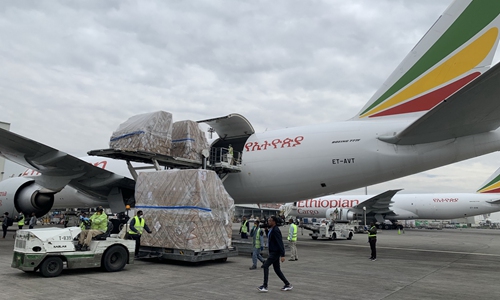African debt to China may be solved through bilateral talks on the basis of equality
By Song Wei Source:Global Times Published: 2020/4/16 21:38:40

An Ethiopian Airlines cargo flight filled with medical supplies donated to Africa from the Jack Ma Foundation and Alibaba Foundation arrives in Addis Ababa, Ethiopia, on March 22, 2020. Photo: Xinhua
The whole world is facing mounting pressure on pandemic prevention and consequent economic contraction as the novel coronavirus ripples across the planet. China, as a creditor of some African countries, has been called upon to offer debt relief which actually is not simple nor effective.
What China could do to help is bring projects funded by loans back to life and realize sustainable profits, instead of measures as simple as offering write-offs. As always, China is open to talk with debtors on the basis of equality and mutual benefit. China, in fact, has been offering debt relief for African countries on two standards. Firstly, the country has been reducing or remitting debt for least developed countries evaluated by the UN, IMF and OECD's annual assessments, and secondly, write-offs for loans that only apply to interest-free loans.
At the 2018 Beijing summit of the Forum on China-Africa Cooperation, China announced to cancel outstanding debts of the least-developed African countries, heavily indebted countries, landlocked developing countries and small island developing states that have diplomatic relations with China. The pledge covered interest-free inter-governmental loans due by the end of 2018.
There are three capital approaches for China's foreign assistance. The first is to grant which loans do not need to be paid back, the second is interest-free loans which are offered by the Chinese government and are applicable for debt relief. The last one is preferential loans for which the principle was raised by the Export-Import Bank of China through the market and set with lower interest rates. The gap of the interest rate would be subsidized by the Chinese government.
The preferential loans are not applicable for debt relief and are more complex with regards to any difficult debt problems. Simply waiving debtors' obligations as some countries or organizations have called for is not going to be effective as a solution. If any debtors encounter difficulties to pay on time, there may be tailored plans including rescheduling or China increasing funding to help related projects resume operation and return profits.
Also, preferential loans could only be issued for entities that are deemed to have the capability to make repayments, and related projects needed to be evaluated as profitable. Normally the loans have a grace period of 10-15 years and would not generate instant pressure to repay.
Due to the commercial character of projects behind preferential loans, it has never been applicable for debt relief. However, any related difficulties regarding repayments could be solved by multiple financial or other approaches, such as China adding grants to help bring projects back to life, conducting debt-to-equity swaps, or hiring Chinese firms to assist operation.
Just like repairing and enhancing a patient's hemopoietic system, adopting such measures to help the projects get back on track and gain profit has advantages over simply offering write-offs which may only solve issues on the surface and are unsustainable.
In the 1970's, China offered a 980 million yuan low-interest rate loan for Africa's Tanzania-Zambia Railway project which encountered operation difficulties in 1993 and then was dealt with via debt restructuring, suspensions and later with a 50-percent debt exemption.
Although preferential loans are not applicable for debt relief, China has never and will not force repayments which was clearly written in China's Eight Principles for Economic Aid and Technical Assistance to Other Countries issued in 1964. Any debt problem could be discussed by both sides and dealt with by tailored plans, which is the same as current circumstances under the pandemic, China is not asking any debtor to pay right away.
The most critical task now is for all countries and entities to actively work together to combat the virus, instead of trying to blame any one side.
China, at the same time, will try its best to assist African countries to fight against the outbreak, such as offering epidemic prevention materials, sending medical teams and assisting hospital construction.
The author is a deputy director at the Ministry of Commerce's Chinese Academy of International Trade and Economic Cooperation who focuses on the study of Africa
Posted in: GT VOICE